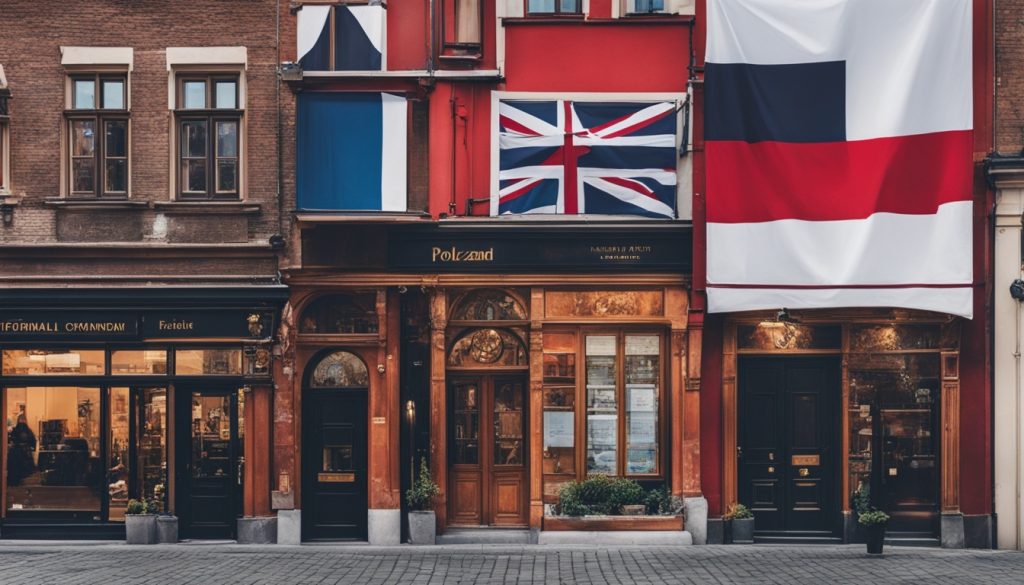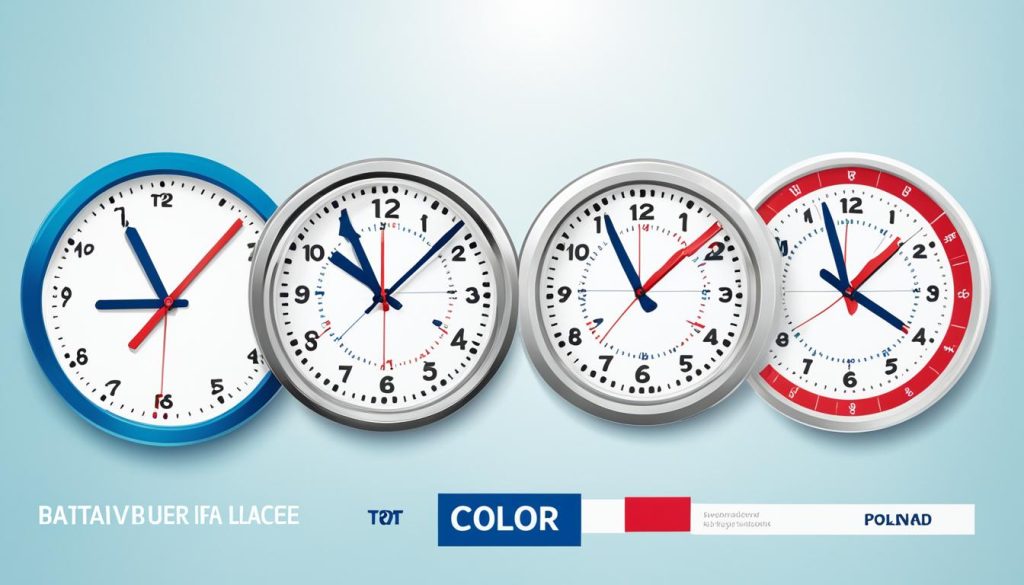Understanding international business means knowing the different cultures involved. It’s essential to learn about the UK business culture and the Polish corporate landscape. This knowledge helps businesses and entrepreneurs connect across the cultural differences. Knowing the right way to behave and deal with business etiquette boosts success abroad.
We start by exploring how traditions, ways of communicating, and expectations mix in the UK and Poland. It’s crucial, whether making deals or forming bonds, to value these differences. It shows good manners and clever business sense.
Key Takeaways
- Understanding UK business culture is pivotal when engaging with British markets.
- Knowledge of the Polish corporate landscape can unlock new opportunities in Central Europe.
- Awareness of cultural differences aids in smoother international negotiations.
- Adhering to proper business etiquette is a sign of professionalism and respect.
- Comprehending international business practices is key to global commercial success.
Introduction to UK and Polish Business Landscapes

Understanding international corporate landscapes means diving deep into UK business culture and Poland’s economic scene. Both are molded by their history, climate, and cultural impacts on business. This creates a mix of diversity and tradition for global business folks.
In the UK, business ways are shaped by a culture that loves subtle communication and humor. This leads to business talks where you need to read between the lines. The UK values making personal connections while making decisions thoughtfully, mixing leadership with teamwork.
“Understanding the professional undercurrents in the UK’s corporate scene can dramatically streamline cross-border collaborations, enabling smoother cultural navigation and fostering enduring partnerships.”
Poland sits in Central Europe and its economy has grown fast after political changes. Its economy now thrives in services. It has well-educated workers and a warm approach to business that’s straightforward – key traits of the Polish economy. Poland’s economy is dynamic and has swiftly become part of Europe’s market, keeping its own business flair.
The table below shows how UK and Poland stand out in the international business world.
| Feature | United Kingdom | Poland |
|---|---|---|
| Communication Style | Indirect, with understated humour | Direct, clear-cut |
| Professionalism | Conservative and formal | Warm and hospitable |
| Decision Making | Hierarchical yet collaborative | Transitioning to more consensus-based |
| Economic Drivers | Diverse sectors with a strong financial services influence | Growing service sector, with a rising emphasis on technology and entrepreneurship |
| Cultural Influences | Deep-rooted respect for tradition and work-life balance | Communal unity with an emphasis on education and adaptability |
Both UK and Poland, with their rich histories and economic paths, are evolving in the international corporate scene. The UK uses its charm and professionalism, while Poland shows its robust progress with an educational push. Both showcase the cultural impact on business in their countries.
To blend your business with these cultures, looking beyond the surface is key. A smart business person will consider these deep differences. It’s about understanding the fine details that form business manners and expectations.
Historical Context and Modern Development in UK Business Practices

UK business history is a story of mixing old values with a strong dedication to professionalism. The journey from the Industrial Revolution to today’s corporate world shows the UK’s skill in adapting without losing its core values. These include respect, etiquette, and integrity.
In the UK, traditional ways of running businesses have met global and technological changes head-on. This blend creates a business culture that’s both rooted in history and moving with the times.
- Preservation of Professional Etiquette
- Adherence to Hierarchical Structures
- Embrace of Diversity and Inclusivity
- Promotion of Work-Life Balance for Enhanced Productivity
Even with its long history, UK corporate practices are still evolving. They combine tradition with innovation to keep up globally. The balance between professionalism and modern strategies makes UK businesses successful.
The evolution towards a professional and diverse business culture is clear. It considers both individual well-being and the organisation’s collective success.
The current corporate scene in the UK values work-life balance highly. It features flexible work options and a focus on mental health. By adapting historical values, UK businesses meet today’s needs. This is shown in the table below, comparing old and new practices:
| Historical UK Business Attribute | Modern UK Business Approach |
|---|---|
| Formal mode of communication | Integration of digital communication platforms for efficiency |
| Rigid hierarchical decision-making | Flattened hierarchies to facilitate faster decision-making |
| Standard work hours | Adoption of flexible working hours and remote working |
| Homogenous workforce | Strategies for diversity and inclusion |
This growth story of UK business combines historical practices with modern approaches. It’s driven by a commitment to professionalism, adaptability, and progress.
Current Economic Climate and Market Dynamics in Poland

Today’s economic scene in Poland is quite inspiring. The shift from a communist system to a market-oriented economy has transformed its market. This change is making Poland more known in Europe and the world. It’s not just changing Poland’s financial paths but also drawing in foreign investors.
Poland’s Transition from Communism to Market Economy
Poland’s move to a market economy has been groundbreaking. After communism ended, big changes happened. Businesses were sold off, new market rules came in, and the banking got a makeover. This switch has helped Poland use its location and hardworking people well, leading to more innovation and business start-ups.
Key Industries and Foreign Investment in Poland
Foreign investment in Poland is booming. Areas like IT, car making, and energy are drawing investors from all over. The service sector is also growing fast, creating jobs and pushing tech forward. Thanks to this investment, key sectors in Poland are thriving, showcasing strong growth.
Poland’s economy and its location are making it very important in Europe. The country’s hard work in renewing its economy is paying off. It’s not just pulling in foreign cash but also making its key industries essential parts of the European economy.
Compare Business and culture between United Kingdom and Poland

When we look at corporate structure comparison, it’s clear that the UK and Poland have unique business scenes. These differences stem from each country’s history and traditions. Knowing this helps investors or businesses planning to enter these markets.
Analyzing Corporate Structures in the UK and Poland
The corporate world in the UK finds its roots in tradition yet leans towards innovation. British businesses respect hierarchy but also value teamwork. This creates a mix of the old and the new. On the other hand, Poland’s business culture showcases resilience and assertiveness, influenced by its history. Polish companies are known for their generosity and open attitudes in business dealings.
The UK vs Poland business culture comparison highlights their distinct approaches. The UK’s business methods are intricate and shaped by a long-standing ethos focus on gradual improvements within a specific framework. Poland, moving past its communist history, opts for centralisation in its corporate structure. This method is efficient and welcoming, marking its strategy with hierarchy coupled with hospitality.
The Influence of Tradition on Business Operations
In both countries, tradition is more than just history. It’s a key driver in business operations. The UK sticks to strict meeting protocols and a traditional way of doing business. This ensures they stay within known limits while mixing in international business practices. It’s where the old meets the new in a productive dance.
Polish businesses, however, value inclusiveness, especially when interacting with international partners. This embrace of the old and new makes them adaptable in the global market. Yet, tradition still plays a big role in shaping their policies and strategic actions.
Understanding the impact of traditional business influences in corporate structure comparison is crucial for global entrepreneurs. It helps them fit into the local business environment, leading to benefits and success in these European markets.
Cultural Norms and Their Impact on UK Business Etiquette

Getting to know UK cultural norms is key to mastering business etiquette there. Rules about how to behave professionally are strong and expected. These include being on time and following dress codes. These norms shape business dealings and help build trust and credibility.
In the UK, acting professionally isn’t just about dressing smartly. It also means showing calmness and confidence in all business situations. How you act in meetings and everyday talks reflects on you and your company. Let’s look at some key areas of business etiquette influenced by UK culture:
- Punctuality: Being on time shows respect in the UK. It shows you value their time and builds trust.
- Meeting Conduct: Behaving properly in meetings is crucial. This includes formal greetings and how the meeting flows.
- Dress Code: Following the dress code shows you’re professional and respect traditional business ways. Dress can vary depending on the company and occasion.
UK business interactions are marked by a mix of directness and polite reserve. Using humour wisely can ease tension and create a connection. However, always be mindful of the situation and who you’re speaking to. Here’s a comparison of professional interactions and their significance in UK business etiquette:
| Professional Interaction | Expectation in the UK | Impact on Business Relations |
|---|---|---|
| Initial Greetings | Formal handshake, brief eye contact | Sets a tone of mutual respect and formality |
| Email Correspondence | Courteous, to the point, with a formal greeting | Keeps things clear and professional |
| Presenting Ideas | Structured and clearly put | Shows you’re prepared and your organisation is solid |
| Making Enquiries | Being direct but polite is good | Creates a clear and open atmosphere |
| Closing Meetings | Summarising and saying thank you matter | Shows appreciation and strengthens common objectives |
By understanding and honouring these cultural norms, individuals and businesses can better navigate the UK corporate world. This leads to successful interactions based on respect and effective communication.
Polish Business Communication and Hierarchical Relations

Understanding Polish business communication is key for global firms entering the Polish market. Its formality is tied to hierarchical structures. Grasping this can lead to smooth interactions and success.
The Directness versus Indirectness in Communication
UK companies often prefer indirect ways of communicating. In contrast, Polish businesses are more direct and clear. This difference affects everything from talks to everyday messages.
| Aspect of Communication | Polish Directness | UK Indirectness |
|---|---|---|
| Negotiation Approach | Clear and to the point | Subtle and consultative |
| Feedback Delivery | Immediate and unambiguous | Measured and diplomatically phrased |
| Decision Making | Decisive with less consultation | Consensus-based with more deliberation |
| Problem-Solving | Result-oriented, seeks direct solutions | Process-oriented, explores various options |
Significance of Hierarchical Structures in Polish Companies
In Poland, corporate structures clearly show who’s in charge. The approach to leading and making decisions usually comes from the top. However, there’s a shift towards teamwork and sharing ideas.
The fusion of hierarchical order with evolving corporate dynamics presents a unique blend of respect for authority alongside the growing value for team input and collaborative efforts.
The Polish business scene is changing, where old meets new. As the world changes, so do the ways Polish firms operate. They balance tradition with the need to innovate and adapt.
Work-Life Balance: A Comparative View

The UK sees work-life balance as crucial. Employees can split their work and home lives. Flexi-work is becoming normal in the UK, showing the care for employees’ happiness. On the flip side, Poland also likes to mix work and life but works longer hours often. This raises questions on how each culture sees work commitment.
Looking at the two, the work-life balance depends on culture and policy. Here’s a quick comparison:
| Aspect | UK Work-Life Balance | Polish Work Culture |
|---|---|---|
| Work Hours | Typical 9 to 5 hours with an increase in hybrid and flexible schedules | Oftentimes extends beyond the typical working hours due to strong work ethos |
| Flexible Working | High flexibility with teleworking and part-time options widely available | Emerging flexibility trends, with remote work becoming more accepted |
| Employee Support | Strong emphasis on mental health and well-being programmes | Growing awareness and implementation of well-being initiatives |
| Cultural Influence | Respect for personal boundaries is culturally ingrained | A cultural inclination towards dedication in one’s work often observed |
| Workplace Norms | Well-defined boundaries between work and personal life | Work identity closely intertwined with personal life |
Both the UK and Poland are adjusting to blend work with life well. They aim to balance job success with personal time. This look lets global firms understand different views and create mixed models for teams worldwide. It shows growing support for a broad view on work-life balance.
Networking and Relationship Building in UK Business Culture

In the modern business world, knowing how to network and build solid relationships is key. This is true in the UK, where connections are highly valued. Here, networking events and online platforms help people grow their reach, share advice, and find new chances. It’s about more than swapping contact details. It involves creating lasting bonds through trust and mutual respect.
The Importance of Personal Connections in the UK
In the UK, personal connections are vital. They help with introductions and solid endorsements. The idea is, knowing the right people is as crucial as having the right skills. Through these connections, you can find job referrals, business partners, or recommended services. These ties lead to influential circles where businesses can prosper.
How Networking Differs in Poland
The approach to networking in Poland focuses strongly on honesty and friendliness. Combining traditional warmth with modern work methods, Polish networking feels more personal. Events aim to build real bonds, not just work links. This leads to deeper cultural connections and professional friendships.
| Networking Aspect | UK | Poland |
|---|---|---|
| Primary Focus | Long-term professional growth | Personal relationship building |
| Approach Style | Subtle and strategic | Direct and hospitable |
| Event Types | Formal and organised gatherings | Smaller, intimate meet-ups |
| Business Advantages | Career pathways, endorsements | Friendship, understanding of cultural nuances |
Networking in the UK and Poland aims for strong networks but in different ways. Knowing these differences is crucial for anyone networking internationally. Adjusting your approach to fit each culture is important.
Decision-Making Styles of UK vs. Polish Management

Understanding how decision-making varies across cultures is key for business success worldwide. Companies expanding internationally must learn about the management methods in places like the UK and Poland. This knowledge helps them work well across cultures and achieve their business goals.
Consensus and Authority in UK Business Decisions
The UK management style expertly balances authority with the need for consensus. British leaders carefully consider different opinions within their teams. This approach makes all team members feel important and part of the process.
It strengthens leaders’ decisions and builds a sense of shared duty. This style makes team members feel valued, boosting their productivity and happiness at work.
Polish Management Approaches and Flexibility
In Poland, management used to be top-down, with leaders making decisions alone. But now, things are changing towards a more open style. Polish leaders are now listening to different ideas to make better decisions. This new approach is more in line with global trends that value innovation and creativity.
This shift not only changes Polish management but also makes businesses more flexible and ready for change.
Both the UK and Polish leadership styles have long histories and have changed a lot over time. By updating their decision-making styles, companies in both countries are making the global business world more diverse and strong.
Impacts of Cultural Diversity on Business in the United Kingdom
Today’s UK corporate world showcases how cultural diversity enriches business. Having a diverse team means more than just filling a quota. It reflects the UK’s embrace of many cultures, boosting innovation, competitiveness, and growth.
Embracing Multiculturalism within UK Firms
UK companies are like beautiful tapestries of many cultures. This blend brings out fresh ideas and drives creativity. Diverse perspectives help UK businesses develop unique strategies and stand out globally.
Diversity’s Role in Innovation and Growth
In the UK, diversity in the workforce powers innovation. Teams with varied backgrounds lead to groundbreaking solutions and products. This approach helps UK firms quickly adjust to new global markets.
| Benefits of Diversity | Examples in UK Business |
|---|---|
| Broad Range of Perspectives | Engagement of international talent in project teams |
| Enhanced Innovation | Development of products tailored to diverse consumer bases |
| Improved Problem-Solving | Use of collaborative forums to troubleshoot from multiple angles |
| Greater Market Insight | Targeted marketing campaigns informed by cultural insights |
| Inclusive Corporate Culture | Policies and programmes promoting inclusion and equality |
Educational Influence on Business Acumen in Poland
Polish education has always focused on high academic standards. This groundwork has helped get a skilled labour force that is both technically savvy and sharp. This connection between schooling and business acumen has played a big part in Poland’s strong position in Europe’s market. Crafting a skilled workforce is a key part of the nation’s economic plan.
Polish schools push students to excel, linking academic success to career growth. This has created savvy managers and business leaders who value knowledge and are eager to keep learning. As a result, the job market is both flexible and skilled, ready to meet new tech trends and industry needs.
Poland’s commitment to educational quality has sparked the creation of business-focused programs. These initiatives show Polish education’s adaptation to business needs. They prove Polish academics and industry experts plan ahead for the economy’s growth, getting professionals ready for future challenges.
But workforce development isn’t just a local affair. Many Polish professionals are also getting degrees abroad. This adds global insights to Poland’s business thinking, making it more open and wide-ranging.
The story of Polish education boosting top-notch business acumen is intentional. It blends academic depth with the realities of modern business. This approach keeps Poland’s workforce development both sharp and forward-moving.
Adapting to Local and Global Market Demands in Both Regions
The rise of global business demands is impacting local economies. Businesses in the UK and Polish markets find it crucial to quickly adapt to the market. They must align with local culture and meet international standards at the same time.
Successful companies today reach and connect with varied audiences. They use adaptable strategies. Here’s a look at how they do it in the UK and Poland:
| Aspect | UK Markets | Polish Markets |
|---|---|---|
| Consumer Sensibilities | Prefers quality and heritage | Values practicality and affordability |
| Business Culture | Emphasises indirect communication with a professional yet amiable approach | Direct, clear communication valued with a strong orientation towards formality |
| Management Styles | Seeking a balance between hierarchical decision-making and inclusive leadership | Moving from autocratic to more participative management practices |
| Local Traditions | Business practices intertwined with British etiquette and historical precedence | Operations infused with Polish hospitality and communal values |
| Global Business Strategy | Adoption of global benchmarks with a British twist | Emphasising local strengths in a global narrative |
Success in the UK and Polish markets needs agility and deep market understanding. It’s important to know the current market and foresee its direction. The skill to balance tradition with global trends is vital for longevity and relevance.
Local and global market resonance needs insight into consumer desires. It also requires flexibility in today’s rapidly changing business world.
“To succeed in today’s marketplace, reflect locally but act globally; guard your cultural uniqueness while embracing universal business practices.”
Business Etiquette and Protocol Differences
Stepping into international trade, we see big differences in how people do business. In the UK, things are pretty laid-back with a touch of humour. This is quite different from Poland, where things are more straightforward and formal. Understanding and adjusting to these differences is key. It’s especially vital when trying to work together or make deals between these two places.
In both UK and Poland, customs shape how business is done, from saying hello to sealing a deal. In the UK, a strong handshake and some chit-chat are common. People quickly use first names, showing a friendly vibe. In Poland, it’s more about keeping things professional with clear boundaries. These habits show the need to respect each region’s way of doing business. It could be making space for British jokes or understanding the formality in Polish meetings.
Knowing how each place operates is crucial for collaborating and holding meetings, deciding what to wear, and how to communicate. Being good at this cultural dance helps avoid mistakes and build strong business relationships. As the business world gets more connected, those who get the cultural nuances right will help their businesses succeed in both the UK and Poland.







